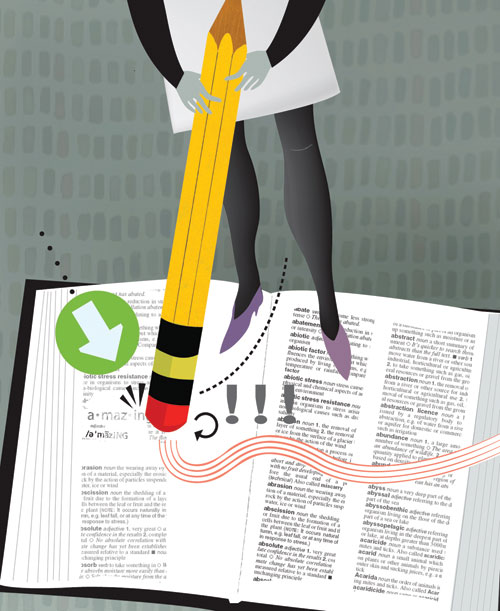
The Amazing Disgrace of Our Language
My longtime friend Dick Wolfsie, a former TV personality who now pens a syndicated humor column, once devoted a full installment to word usages that bug him. There was at least one paragraph about the shameful folk who say “Kroger’s” instead of the store’s correct name, “Kroger.” This may not seem like much to normal people, but writers tend to get undone over the smallest language malfeasances.
Like Dick, I can’t stand to hear “St. Vincent’s” hospital rather than “St. Vincent,” or see the improper use of “it’s” as a possessive. However, I have a new semantic bone to pick: overuse of the adjective “amazing,” which now describes everything from a red-carpet gown to a robot.
According to Juan Pablo, this year’s TV Bachelor, Nikki was an amazing girl, with whom he had amazing dates. So was Sharleen, before she dumped him and walked off the show—and then was mourned by the star as the amazing girl who got away. He had an amazing overnight with Andi, who exited in a huff the next day. Contestant Renee described Juan Pablo to her mother as amazing, causing the elder to prod, “He’s amazing?” “Amazing,” Renee echoed. She became engaged to another before the show’s final installment even aired. So much for amazing.
What does all this mean? Nothing—that’s what it means. When a descriptor is dispensed with such little care (or intelligent thought), it loses all power. It becomes the spec-house beige of words, a term like “nice” that evokes no image at all.
According to the ads, DiGiorno is amazing pizza, and Centrum Silver vitamins treat the most amazing parts of you. You deserve an amazing breakfast at McDonald’s; Playtex bras offer amazing support; the best vacuum is the amazing Hoover FloorMate Deluxe; and Toyota’s selection of cars and trucks, says national spokeswoman Jan, is amazing as well.
All the women at the Oscars, proclaimed the hosts and fashion pundits, looked amazing, with the exception of Sandra Bullock, who looked absolutely amazing. During that three-hour marathon, I delighted at Kerry Washington’s description of Pharrell Williams singing “Happy” as “phenomenally cool,” a depiction I could at least conjure in my mind. Among the amazing visual effects, amazing casts, amazing vision, and even amazing distribution, hearing the movie Her described as “strange and soothing” provided a pleasant break.
Together, we must resist latching onto what is popular merely because it’s easy.
An esteemed former editor and colleague of mine used to preach the importance of showing, not telling. This valuable rule was simple. Don’t say someone’s eyes are pretty. Say they are wide, deep blue, and fringed with thick black lashes. Likewise, ravioli is not good; it is pillowy, with a nutty and sweet squash filling. Apparently, TV personalities (and that means you, Kathie Lee) missed that lesson, preferring to call Jimmy Fallon’s debut on The Tonight Show amazing, just like the resort trip given away a few seconds later.
When Priceline declares an Express Deal amazing, and J.Lo judges an American Idol contestant by saying, “Your voice is amazing—you did an amazing job,” I am left cold. Meaning becomes lack of meaning, and everything fades to gray. Boxer Wladimir Klitschko calls his fiancee, Hayden Panettiere, an amazing person, and Amy Adams is inspired by Meryl Streep’s amazing ability. Are these portrayals genuine, or just blank words uttered to fill space and time?
I say we reserve the once-vaunted word, meaning “astonishing, remarkable, miraculous, mind-blowing, staggering,” to people, places, and things that actually are. Sinkholes that swallow up cars are amazing, as was what happened to Rickey Wagoner, the Dayton bus driver who was shot three times, with two of the bullets lodging in a Bible in his breast pocket. (Hoda Kotb called this an amazing, amazing, amazing moment.) The California couple who stumbled across $10 million in rare coins while walking their dog? Amazing indeed.
For matters of less significance, we need to try harder. Nashville’s Rayna Jaymes needs a better way to describe Scarlett’s singing than amazing. How did Rachel Frederickson, who lost 60 percent of her body weight on The Biggest Loser, feel when she walked onstage at the end of the competition? “Amazing!” And someone should have coached the Olympic athletes; surely their experiences—win, lose, or bronze—couldn’t all have been amazing.
It is time for originality to reign. Amazing is the new awesome, but what comes next? “Epic” seems to be gaining traction, as in Atlanta’s epic February ice storm, the epic senior lock-in on Glee, and the epic series Cosmos: A Spacetime Odyssey. At the moment, though, “amazing” reigns supreme and, for dramatic effect, is sometimes even pronounced “ahhhh-may-zing.”
I need your help in eradicating this banal word from our lexicon. Together, we must be creative and resist latching onto what is popular merely because it’s easy. In her earlier days, a writer who works at this magazine infamously sat before her computer for hours—days, even—seeking out the one exact word needed to make her point perfectly. She missed deadlines. She missed lunch. But she ultimately came up with the word, and I respect her.
Ironically, I recently heard Grant Barrett, co-host of public radio’s A Way with Words, describe Beyonce thusly: “Her album’s amazing. She’s amazing.” It’s clear that if I want to be surrounded by more sophisticated language, I must upgrade my viewing and listening choices. In the meantime, my grassroots effort begins now. With you. And with me, guilty of using the A-word 41 times in these two pages alone. Together, we’ll make the world of spoken communication a more amazing (42) place.
deborah@emmis.com
Illustration by Andrea Eberbach
This column appeared in the June 2014 issue.





